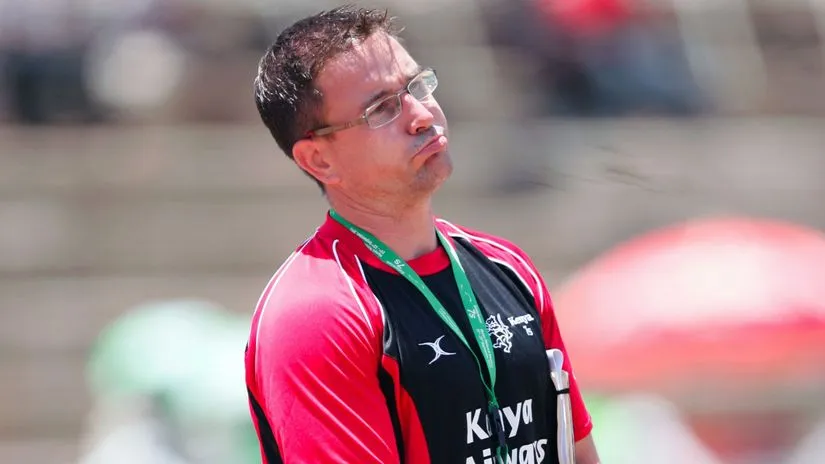Los Angeles 7s and Kenya’s performance captured not only the raw numbers of the scoreboard but also the deep emotional undercurrents of global sevens rugby’s changing landscape. For the men’s national team, Shujaa, the journey to Southern California proved to be a dramatic crucible, testing not just their skills but their spirit in the face of unexpected adversity.
A new format, a bitter twist
The overarching narrative of the 2025 Los Angeles 7s is indelibly marked by the controversial new HSBC SVNS Series format. Instead of the expected battle for promotion, news broke while the team was still absorbing the afterglow of a valiant performance in Singapore: only the top eight teams after the Singapore leg would keep their coveted core status for the 2026 season and compete for the world championship in Los Angeles. Kenya, falling outside that elite bracket, suffered automatic relegation, a blow that blindsided both the squad and their supporters.
Shujaa’s head coach, Louis Kisia, shed light on the camp’s mood, painting a picture of disbelief and disappointment. “I could not believe what I was reading. It hurt me, it broke me, and it is very unfortunate. Tough on us, but tougher for the boys,” he admitted. For a group that clawed its way back into global reckoning after a stellar run to the Singapore final, the ruling felt like the rug was pulled from beneath their feet. Kisia’s resolve—to play their hearts out in Los Angeles and regroup for the future—stands as a testament to the team’s resilience, even as the stakes were suddenly raised.
Backlash from the rugby community
The announcement reverberated across the rugby world, igniting fierce debate and backlash. One of the loudest voices was former Kenya and USA coach Mike Friday, who lambasted the decision as “shameful, unprofessional and Machiavellian.” In his words, the move betrayed the game’s ethos and the legacy of pioneers like Beth Coalter and Vernon Pugh, whose commitment made Olympic dreams possible and fostered sevens rugby’s global reach.
Friday’s condemnation was uncompromising, framing the overhaul as less about sustainability and more about elitism. The new structure creates three divisions, with only a select few making it to Division 1. Critically, for teams like Kenya Sevens, falling into the lower tiers means a far more arduous path—a gauntlet through high-pressure playoff matches and potentially, regional qualifiers, just to stay on the global stage.
Raw emotion and renewed focus
Co-captain Samuel Asati, mirroring the sentiments of his coach, acknowledged the sense of loss but steered the group’s focus towards the present. “Even with the new format, our goal is still to win all our matches. Hopefully, the boys will rise to the occasion,” he said, calling upon the team’s “eighth players”—their loyal fans—for continued support. The message was clear: in the face of systemic obstacles, the heartbeat of Kenyan rugby is intact and still pounding with pride and hope.
The Los Angeles campaign—pain and promise
Shujaa’s Los Angeles story began on a somber note with a 19-12 defeat to Samoa, a match that echoed the heartbreak of the Paris Olympics the previous year. Samoa, organized and relentless, surged to a 12-0 lead before Kenya’s rising star, Nygel Amaitsa, narrowed the gap just before halftime. Despite a gritty comeback and flashes of offensive brilliance, Kenya trailed desperately in the second half, ultimately falling short as Samoa’s clinical edge prevailed.
Yet if there is one unshakeable trait about Shujaa, it is their ability to respond to setbacks with defiant flair. In their second pool match, facing Portugal—a team hungry for opportunity—Kenya found themselves trailing 7-0 at the break. But Shujaa, powered by Kevin Wekesa and the ever-reliable Omondi, flipped the script. Wekesa’s double sparked a second-half surge, while Amaitsa and Patrick Odongo added insurance tries to secure a resounding 26-14 win. This comeback not only breathed life into their knockout hopes but also provided solace and a sense of redemption after a tough season marred by structural upheavals.
Wider impact and the pathway ahead
The new format casts a long shadow over Kenya’s future in the sevens arena. As it stands, Shujaa will compete in the rebranded Division 2 for the coming season, with every outcome carrying enormous weight for hopes of promotion. Success now depends on navigating a treacherous playoff system, where every match is a must-win and the margin for error has all but vanished.
The urgency of this moment cannot be overstated: should they falter and finish among the lowest ranks, Kenya could be forced to contest in regional qualifiers, risking further obscurity and loss of global standing. The team’s pride and the support of passionate fans become more crucial than ever as the stakes escalate.
Parallel struggles—the Lionesses’ tough journey
Kenya’s women’s team, the Lionesses, mirrored much of the pain felt by their male counterparts. Opening with back-to-back defeats—first to Spain (33-14) and then to Brazil (28-10)—the Lionesses faced their own baptism by fire in Los Angeles. Despite promising moments, including tries from Freshia Oduor and Grace Okulu, systematic errors and lapses allowed their opponents to build insurmountable leads.
With only the top four teams in the playoffs earning a place in the newly structured 2026 HSBC SVNS Division 2, the Lionesses’ next match against Colombia becomes a do-or-die encounter—a microcosm of Kenyan rugby’s fight for pride and future relevance on the world stage.
| CASINO | BONUS | INFO | RATING | |
|---|---|---|---|---|
|
bonus
Daily 25% bonus on your deposits!
See 6 Bonuses
|
info
Curacao 1668/JAZ Generous casino bonuses |
|||
|
bonus
New players get 50 free spins and a Ksh 2500 freebet!
See 7 Bonuses
|
info
BK 0000665 PG 0000405 Good combination of online casino and betting platform |
|||
|
bonus
WELCOME BONUS UP TO 19000 KES FOR SPORTS BETTING
See 11 Bonuses
|
info
PG 0000423 A simple way to start playing |
|||
|
bonus
100% bonus up to 15000 KSH on first deposit!
See 9 Bonuses
|
info
BK 0000698 PG 0000424 Excellent customer support, large selection of slot games, and multilingual website. |
The human story—courage under pressure
Statistics may record results, but they rarely measure the real cost of radical change, nor do they capture the moments of courage and unity forged in adversity. At the Los Angeles 7s, Kenya’s rugby teams found themselves at the intersection of heartbreak and hope. Shujaa’s response—refusing to capitulate, fighting each minute, and roaring back in style—proved that identity and pride can persist even when the system seems stacked against them.
For the coaches, players, and supporters alike, the battles fought in Los Angeles will be remembered long after the final whistle. It is in these matches, under these circumstances, that the soul of sport—its ability to inspire, to demand excellence, to crystallize resilience—shines brightest. Kenyan rugby’s dreams may be delayed, but if Los Angeles showed anything, it is that the will to rise again burns undiminished.










